February 19th, 2018
“I have written 11 books but each time I think ‘Uh-oh, they’re going to find out now. I’ve run a game on everybody, and they’re going to find me out.”– Maya Angelou
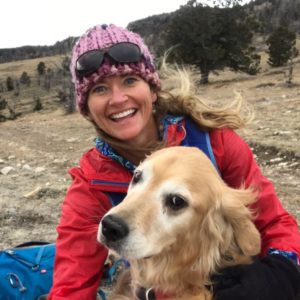
It was still dark out. It was December, and it was 6:45 in the morning. My Uber driver was helping me try to figure out where to deliver me as we drove in circles around the new and impressive Mercedes Benz Stadium in Atlanta, GA.
I had been hired to give my “Epic Lessons Learned in the Field” keynote presentation to women leaders who work for the Arthur M Blank family of businesses. I snapped a few photos of the new stadium as we drove around it, and texted them to my sons, who were likely still asleep in their beds in our Wyoming home. As far as my sons were concerned, this gig was my coolest yet, and they had requested I get photos.
As we drove circles around the stadium, with a few more minutes available to kill before I’d have to choose a place to get out, I worried about what I had chosen to wear. I had on what I usually wear for these keynote presentations – jeans, a nice blouse and boots. I don’t own any pantsuits, and would feel awkward wearing one. I will wear a dress, but usually only for special occasions like weddings, etc. (One time, when our youngest son was 4, and I came downstairs in the morning with a dress on, he remarked, lovingly, “I like your costume, Mommy.”)
I wondered about the women leaders I would soon meet – “corporate” women who live in a city and work for a prestigious organization, and who probably earn considerably more money than I do. I wondered if they would expect me to be more dressed up? I felt honored to have this opportunity, and I didn’t want them to view my being “not very dressed up” as indicative of the amount of respect I had for them, their time, and their hiring me as a keynote presenter. I know, such thinking is foolishness, but when we’re feeling nervous, the stories that play in our head can be quite compelling. Our insecurities come out in full force and I’m no exception.
Luckily, amidst the worries about my outfit, I remembered a bit from Brené Brown’s most recent book, Braving the Wilderness, which I had recently read. I recalled specifically Brown’s sharing about a time she was about to give a big presentation and changed from the outfit she thought she should wear to the outfit she was meant to wear. Thank you Brené! I thought to myself. (I am so familiar with, and aligned with Brené’s work that I refer to her on a first-name basis. She is one of my friends, even if we’ve never met.)
As my driver and I agreed about where to drop me off, I requested that he return in two hours to take me to my next place of work – Turner Networks.
<Gasp>
Turner Networks. As I said it out loud, I sensed the familiar rush of panic I had experienced off and on in recent days. The feeling was one of paranoia. The fear that I was going to be “found out,” that I was claiming to have particular abilities or qualities that I didn’t really have, was palpable. All at once, I was panicking about, and wondering how it was that I was here, about to present at the Mercedes Benz Stadium, and then at Turner Networks. These two opportunities felt like big breaks for me, and I was wondering if it were a mistake that I had been hired.
By the way, every single speaking engagement I’m hired for feels like a big break for me. I struggle with these doubts when presenting during various conferences in my home state of Wyoming, to leaders at SapientRazorfish, or Johnson & Johnson, and even when presenting to middle schoolers in my small hometown. It’s just that somehow these bigger-name opportunities felt like the ultimate opportunity for me to see if my inner critic was not correct, if I was really not a fraud.
I wasn’t a fraud. I’m not a fraud. I am, however, human, and the experience I describe above is something most of us experience from time to time, especially when we’re stretching and daring to fail. We experience it whenever we’re leveling up and daring to do something that’s bigger, or more high level, than we’ve done before.
There’s a name for this experience. It’s called the “Impostor Syndrome.”
Impostor Syndrome is a concept describing individuals who are marked by an inability to internalize their accomplishments and a persistent fear of being exposed as a “fraud”. The term was coined in 1978 by clinical psychologists Pauline R. Clance and Suzanne A. Imes. Despite external evidence of their competence, those exhibiting the syndrome remain convinced that they are frauds and do not deserve the success they have achieved. Proof of success is often dismissed as luck, timing, or as a result of deceiving others into thinking they are more intelligent and competent than they believe themselves to be. While early research focused on the prevalence among high-achieving women,impostor syndrome has been found to affect both men and women, in roughly equal numbers. (Wikipedia)
Amanda Palmer is an artist, singer-songwriter and author of a great book, The Art of Asking: How I Learned to Stop Worrying and Let People Help. In her commencement speech to The New England Institute of Art class of 2011, Palmer refers to the Impostor Syndrome as a visit by “the fraud police.”
Explains Palmer: “The fraud police are this imaginary, terrifying force of experts and real grownups who don’t exist, and who come knocking on your door at 3am when you least expect it, saying, Fraud Police: We’ve been watching you, and we have evidence that you have no idea what you are doing, and you stand accused of committing the crime of completely making shit up as you go along. You do not actually deserve your job and we’re taking everything away, and we’re telling everybody.
“People working in the arts especially have to combat the inner fraud police on a daily basis. And even if you’re a very happy, healthy, confident person, the fear of the fraud police is ever lurking. And it really doesn’t matter who you are. I have friends who are teachers, and writers and psychologists and scientists and pretty much every profession under the sun, and everybody, every so-called adult I know has had this feeling about their job and themselves at some level.”
But now let’s return to my story, at the Mercedes Benz Stadium on Dec. 14. It didn’t matter that I had been hired to give my presentation several times before at conferences and for organizations in Atlanta, Miami, Toronto, Los Angeles, Chicago, Cleveland, Detroit, Boston, London, and in Idaho, Montana, Wyoming, and other places. It didn’t matter that I had received favorable feedback and numerous “testimonials” validating my presentation abilities. It didn’t matter that all of the content I share is mine, or that I’ve worked very hard to create it, or that I’ve spent hours in preparation so I could present it to the best of my abilities, or that I believe strongly in the message I am hired to share. In the moments of doubt, when the “fraud police” are doing their investigating, all of this is forgotten, and my being here is chalked up to luck and my apparent skill for pulling the wool over people’s eyes.

Posing with the wonderful women leaders of the Arthur M Blank family of businesses at the new Mercedes-Benz Stadium following my presentation this past December.
Regardless of my credentials and “proof” that I am not a fraud, I have been trying to avoid the fraud police for as long as I can remember.
When a group of six people fly from their comparatively big cities into Wyoming to go on unplugged treks into the Wilderness with me, I have moments of panic and self doubt, as I am reminded of the weight of responsibility that comes with leading people into the rugged and remote wilderness. In those moments of self doubt, my experience, expertise and competence are forgotten or significantly downplayed.
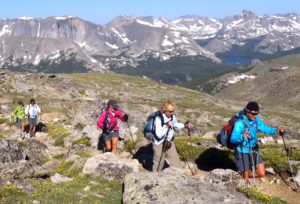
Leading a wilderness trek.
Sometimes before a coaching call, I doubt myself and my abilities. Sometimes, before I hit “send” on an email I’ve drafted for someone I admire and respect and want to connect with, the fraud police show up and question my value and worthiness. They demand, Who do you think you are? Why would they want to hear from, or connect with you? If I want to deepen a friendship and do something extra thoughtful, I might hesitate due to the fraud police, who show up right before and question my ability to be a good friend. As a mother, I feel like an impostor all the time. As hard as I try to be the mother I want to be to my three sons, I often doubt my abilities and qualifications.
I have endless examples of experiencing the Impostor Syndrome, but I’m thinking particularly of one from seven years ago, when I was first developing my keynote presentation.
A dear friend and “champion” of mine, Debbie, offered to host a brunch for women leaders at her home in San Francisco, during which I could “test drive” my Epic presentation. At the time, Debbie was chief of people at Mozilla, and she was –is– networked. Her offer was generous. For this Wyoming country bumpkin to get the opportunity to present her message to corporate women leaders… Well, it seemed too good to be true, and yet it was true.
I would have been nuts to say No, so I said Yes. But as the event drew closer, I started negotiating with myself, and looking for a way out. It was all too much. It was too big. What was I thinking? Fortunately, despite the second-guessing, the value I place on commitment is so high that I honored my plans and traveled to San Francisco.
On the morning of the presentation, as women starting arriving at Debbie’s, with just minutes to go before my presentation was to begin, I retreated to a guest room and became what can only be described as paralyzed in fear. I was hunched in a chair trying to get myself together, to get “in state.” But instead I was freaking out, nervous and sweating. The fraud police were relentless. What if these women don’t find what I have to say compelling? What if they’ve heard it before? What if nobody but me cares about what I am here to say? What if they gave up their Saturday morning to hear something that’s a waste of their time?
Finally, it was time to present, and so I left my hiding place and entered the living room to give my presentation. Thank God the presentation went well, and my feeling like a fraud, at least on that day, was short-lived, and I wasn’t arrested.
But this is an ongoing struggle. The fraud police visit me often, and I’m guessing they also visit you once in a while?
All of the leaders I’ve worked with and coached, and – for that matter – all of the people I know well, have themselves, at times, struggled with the Impostor Syndrome.
Thankfully, we have people like Amy Cuddy to help us. Cuddy is a social psychologist, a professor of the Harvard Business School, and author of Presence, a book I highly recommend.
Cuddy explains, “Impostorism causes us to overthink and second-guess. It makes us fixate on how we think others are judging us (in these fixations, we’re usually wrong), then fixate some more on how those judgments might poison our interactions. We’re scattered—worrying that we underprepared, obsessing about what we should be doing, mentally reviewing what we said five seconds earlier, fretting about what people think of us and what that will mean for us tomorrow.
“The general feeling that we don’t belong—that we’ve fooled people into thinking we’re more competent and talented than we actually are—is not so unusual. Most of us have experienced it, at least to some degree. It’s not simple stage fright or performance anxiety; rather, it’s the deep and sometimes paralyzing belief that we have been given something we didn’t earn and don’t deserve and that at some point we’ll be exposed.”
Cuddy says we’ll likely never completely shed our fears of being fraudulent. “New situations may stoke old fears; future sensations of inadequacy might reawaken long-forgotten insecurities. But the more we are aware of our anxieties, the more we communicate about them, and the smarter we are about how they operate, the easier they’ll be to shrug off the next time they pop up. It’s a game of whack-a-mole we can win.” (By the way, after reading this post, be sure to check out Cuddy’s Ted Talk. There’s a reason it’s been viewed 47 million times.)
I’m including some statements below from a wide range of people who are far more accomplished and famous than I am – people most of us think of as incredibly talented and maybe even as fearless.
“The beauty of the impostor syndrome is you vacillate between extreme egomania and a complete feeling of: ‘I’m a fraud! Oh God, they’re on to me! I’m a fraud!’ . . . just try to ride the egomania when it comes and enjoy it, and then slide through the idea of fraud.” –Tina Fey, actress, comedian, writer, and producer.
“I am not a writer. I’ve been fooling myself and other people.” —the late John Steinbeck, an American author who won the 1962 Nobel Prize in Literature.
“You think, ‘Why would anyone want to see me again in a movie? And I don’t know how to act anyway, so why am I doing this?’” – Meryl Streep (recipient of 21 Oscar nominations)
“Every time I was called on in class, I was sure that I was about to embarrass myself. Every time I took a test, I was sure that it had gone badly. And every time I didn’t embarrass myself — or even excelled — I believed that I had fooled everyone yet again. One day soon, the jig would be up … This phenomenon of capable people being plagued by self-doubt has a name — the impostor syndrome. Both men and women are susceptible to the impostor syndrome, but women tend to experience it more intensely and be more limited by it.” —Sheryl Sandberg, COO of Facebook, and author of Lean In, and founder of LeanIn.Org.
“Some years ago, I was lucky enough to be invited to a gathering of great and good people: artists and scientists, writers and discoverers of things. And I felt that at any moment they would realize that I didn’t qualify to be there… I was standing at the back of the hall, while a musical entertainment happened, and I started talking to a very nice, polite, elderly gentleman about several things, including our shared first name. And then he pointed to the hall of people, and said words to the effect of, ‘I just look at all these people, and I think, what the heck am I doing here? They’ve made amazing things. I just went where I was sent.’ And I said, ‘Yes. But you were the first man on the moon. I think that counts for something.’ And I felt a bit better. Because if Neil Armstrong felt like an imposter, maybe everyone did. Maybe there weren’t any grown-ups, only people who had worked hard and also got lucky and were slightly out of their depth, all of us doing the best job we could, which is all we can really hope for.” —Neil Gaiman, author of short fiction, novels, comic books, graphic novels, audio theatre, and films.
Well, okay, then, people who live in Wyoming, and also famous people occasionally experience, and must contend with the Impostor Syndrome, and feeling like a fraud.
Yay for none of us being alone in our struggles with self doubt.
But what can we do about it? How can we better manage it so we don’t feel paralyzed and rattled, right before we step up to the plate?
One thing I like to do, and promote, is to view the arrival of the fraud police, the experience of Impostor Syndrome as something positive. I know, this is easier to preach than to practice, but when the fraud police show up, their very presence is an indicator that we’re pushing our limits, and daring to level up. For people like me, someone who wants to always be self actualizing and learning, it is good news, then, when the fraud police stop by.
By the way, in my humble opinion, no one is fearless. I always cringe a little when I see advertisements or articles encouraging us to be “fearless.” I think if we’re going to push our limits and dare to fail, it’s impossible to be without at least some fear. However, I do know that we can get better trained, and more experienced, at being with fear. We can almost always be more daring and courageous.
So, the strategy I’ve come up with to help me when I’m experiencing the Imposter Syndrome is this: I try first to notice the sensation – the feeling –of the Impostor Syndrome. For me, if I’m attuned, I feel a rush of heat and a shortness of breath, along with thoughts of panic and paranoia. I hear the voice of my inner critic telling me I’m in over my head, that I don’t know what I’m doing etc. I notice and feel all of this, and then, I acknowledge the IP, respectfully even, and I say to it, “Thank you for stopping by. I appreciate your concern. You’re right, the stakes are high. I better focus and pay close attention.” You could say that I put them “in the backseat.” The fraud police are still trying to tell me how to drive, but I’ve put them in their right place. I’ve taken them out of the driver’s seat, and quieted their voices some. Then, I hopefully will dare to proceed to the best of my abilities.
Valerie Young has spent decades studying research that looks at fraudulent feelings among high achievers. (Young is the author of The Secret Thoughts of Successful Women: Why Capable People Suffer from the Impostor Syndrome and How to Thrive in Spite of It, and her website is ImpostorSyndrome.com,)
Drawing on the work of psychologists Pauline Rose Clance, PhD, and Suzanne Imes, PhD, Young uncovered several “competence types” that people who struggle with the IP generally follow.
The competence types are, The Perfectionist, the Superwoman/man, the Natural Genius, the Rugged Individualist, and the Expert. To learn more about how to identify the various types of Impostor Syndrome, see this Fast Company article by Melody Wilding.
In closing, I almost didn’t hit Publish on this blog post because my inner critic is telling me nobody will read it, and that what I have to say is not valuable, “and besides, you’re an impostor.”
But then I remember that I want to be someone who is brave, and in order to be brave, I must be willing to do things that make me uncomfortable. I must be vulnerable.
This makes me think of a favorite line from slam poet Andrea Gibson’s poem, Elbows: “Brave is a hand-me-down suit from Terrified As Hell.”
As you know, I hit Publish, even though I sorta felt “terrified as hell” and like throwing up as I did so.
Thank you for reading, and cheers to leveling up, to being with the experience of the Imposter Syndrome, and knowing you’re not alone.
February 26th, 2016
Did you know that the biggest regrets people have when they are approaching the end of their life are not related to things they’ve done, but rather things they didn’t do? It’s true. They are more disappointed, and regretful, about the things they didn’t do, that they wished they would have done, that they can no longer do.

Howdy.
When it comes to regrets, I think there is no better teacher than someone who is approaching the end of his/her life because they literally and truly view each day of their remaining life as a gift, and they are more reflective than most of us.
But it’s not only the dying who feel this way about regrets. I read a lot of books, and one of the books I’m currently reading is Originals, by Adam Grant (also the author of one of my favorite leadership books, Give and Take). Grant is awesome. He’s the youngest tenured, and highest rated professor of psychology at the Wharton School, and what he has to share, which is always backed by research, is compelling. Recently, in a LinkedIn post, he wrote: Most people predict that it’s the actions they’ll regret more. We cringe at the anguish of declaring bankruptcy or getting rejected by the love of our lives. But we are dead wrong.
When people reflect on their biggest regrets, they wish they could redo the inactions, not the actions. “In the long run, people of every age and in every walk of life seem to regret not having done things much more than they regret things they did,” psychologists Tom Gilovich and Vicky Medvec summarize, “which is why the most popular regrets include not going to college, not grasping profitable business opportunities, and not spending enough time with family and friends.”
So I challenge you to ask yourself these questions, reflect on them, and then answer them (for yourself, or in the comments section if you’d like to share – and feel held accountable as a result).
1. What is something I am wanting or needing to do, but I’m not doing?
2. Why I am not doing it?
3. What am I waiting for?
I would never ask you to do something I’m not willing to do, so I’m also doing the work. I’m getting ready to go on a walk in the woods, and I am going to turn it into a productive meditation focusing on these three important questions.
Have a great day, and thank you for stopping by and reading my blog.
———————————————————————-
If you could use a coach to help you change your life, accomplish a goal or two, make or break a habit, or to dare you to crank it up a notch, please keep me in mind. I’ve coached 115 individual leaders from throughout the U.S. during the last 5 years, and I’ve learned a lot. I also do keynote presenting and leadership development facilitation. Here’s my Brochure. Or, if you’re a woman and you’re interested in making some changes to your life, getting in the best shape and health of your life and want to go on an unforgettable, 5-day guided Epic Adventure, please consider my Epic Women program. I’m recruiting right now and have 4 spots remaining on the roster.
May 5th, 2013
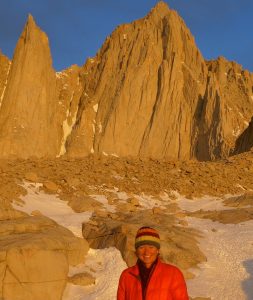
At Mt. Whitney’s high camp.
People don’t hire a life coach so they can keep operating in their comfort zone. Rather, people hire a life coach to dare them to leave their comfort zone. Change cannot be made in the confines of our comfort zone, within the confines of our fears. So we have to dare to explore the edges, to dare to enter a space that is full of uncertainty.
To grow and develop — and follow our bliss — we have to explore the edges of our abilities. We must level up, and I’m so compelled by its value that I’ve built Epic Life around the concept.
Every year I “sign up” for at least one major adventure — what I’ve come to refer to as an Epic Adventure. It could be a hike that covers a greater distance than I’ve ever hiked in a 24-hour period, such as the Rim-to-Rim-to-Rim day hike I did in 2010, or the 50-mile traverse day hike of Zion National Park I did in 2011. Or, it could be climbing the Grand Teton, or Mt. Whitney. Or, many times it’s not outdoors-related at all but it’s still an epic adventure. It could be a proposal or call I make to a high level executive or corporation, or a speaking gig to a high profile audience I dare to accept. For example, we’re about to embark on a 30-day family trip to Europe. Talk about an epic adventures. This is a dream-come-true that is a big financial investment and a lot of time to be a long way from home. We are mostly excited, but nervous too. That is how you know if you’re exploring your edges — it’s something you want to do, and yet it makes you a little, or a lot, uncomfortable.
That said, I do make lots of room for epic outdoor adventures because so much growth happens and in a setting that will inspire me for days and months and years.
In leveling up, at some point during the adventure, I am not enough. I will not have what it takes. This is scary and uncomfortable. This is when I will find myself asking “whose idea was this?” and remember that it was mine. It’s also a powerful point in the adventure because at this crux, I can make a choice: I can quit, or I can continue — learning the skills I need along the way. The adventure becomes a journey of personal discovery as I’m forced to explore the edges of my abilities — to see what I’m made of, and also to discover what’s possible.
If we are to live our best, most epic life, we must dare to live and operate at these edges often.
Living at the edges is not unique to outdoor adventure. Often we are at our edges at home and at work.
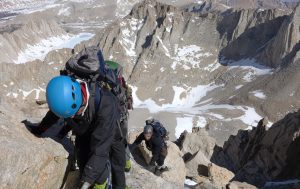
Exposure. Or, scrambling up the last section of Mt. Whitney’s Mountaineering Route.
Think of some of the most nerve-wracking moments you’ve experienced — especially ones that you consciously chose to be a part of. I remember when my friend, Debbie Cohen, chief of people for Mozilla, so generously offered to host a brunch at her San Francisco home for women corporate leaders in her circle so that I could practice my pitch/presentation for Epic Life. I would have been nuts to say no, right, especially given corporate women are my target market. So I said yes. But as the event drew closer, I started negotiating with myself, and looking for a way out. It was all too much. It was too big. What was I thinking? Despite this second-guessing, I hung in there with my commitment to the brunch presentation.
On the morning of the presentation, as women starting arriving at Debbie’s, with about five minutes to go before my presentation was to begin, I retreated to a guest room and became paralyzed in fear. I can experience those emotions of stress and fear by recalling the experience. I was hunched in a chair trying to get myself together, to get “in state.” But instead I was freaking out, nervous and sweating. Hiding, really. I second-guessed myself and my presentation, and Epic Life. “What if these women don’t find what I have to say compelling? What if they’ve heard it before? What if nobody but me cares about what I am here to say?” And so on. Finally, it was time to present, and so I left my hiding place and entered the living room to give my presentation.
The presentation went well and the women were lovely. They provided enthusiastic support for my message and my business, while providing valuable feedback. Even if the presentation were a bomb, the experience of leveling up (raising my game) would have been beneficial in that it caused me to develop new skills and to “cowgirl up.” The experience made me better. And I’m grateful to Debbie, one of the biggest champions of people I know, for giving me the opportunity to rise up.
Just daring to level up is the equivalent of standing on a summit of a mountain. While I love standing on the top of a summit, in my humble opinion, daring to start up the mountain in the first place can be more significant than standing on top of it.
An example of leveling up in my personal life would be the fact that our oldest son, who just turned 13, will be going on a jet, alone, to a junior leadership conference on the East Coast for a week. That will not be easy for my husband and I, and Wolf’s brothers. I will be a mess putting him on a plane. Yet, it will be an amazing experience for our son.
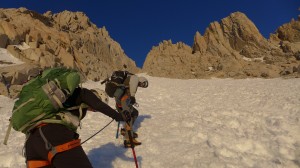
Ascending the couloir, while being short-roped into my summit team.
There are many more experiences like this that I could list. I challenge you to reflect on your own experience of living at your edges.
Regardless of how different our experiences may be, the emotions related to each are the same: fear, stress, anxiety. During these times at our edge(s), we yearn for safety.
Recently, I had the tremendous honor of climbing Mt. Whitney with Backpacker magazine editors and readers who raised a combined $250,000 for Big City Mountaineers, an organization that provides wilderness mentoring and experiences for disadvantaged urban youth. (Thank you to Sierra Mountaineering International for the phenomenal guiding)
It was an amazing opportunity to raise money and climb a mountain for such an important cause. And, sure, climbing Mt. Whitney would be an awesome adventure that would give me another interesting story to tell. But more importantly, the adventure would require me to be at my edges. Frequently. So of course, I said yes when my friend, Jon Dorn, informed me there was available space on Team 4, and invited me.
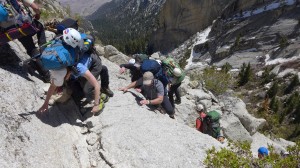
Ascending “The Ledges” on Day 1.
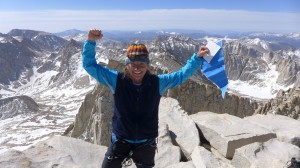
Yeehaw! (On the summit of Mt. Whitney.)
Since returning from the adventure, I have reflected on the many times I was operating at, or beyond my edges during the adventure.
They include:
–Backpacking with 11 strangers. (I knew two of my teammates; the other 11 would be people I would meet in person for the first time) As usual, per these epic adventures, I left Mt. Whitney with many meaningful new friendships.
–Being in unfamiliar country. It would be my first time to the area.
–I had to wear rigid, really warm mountaineering boots. This may not sound daunting to most, but to me, someone who typically hikes in trail-running shoes and who has blister-prone feet, it would be uncomfortable for me.
–The Ledges. On our hike in, shortly after leaving the Mt. Whitney hiking trail, we’d have to ascend “The Ledges,” which were composed of about 400′ of granite slab(s) we’d have to use hands and feet to get up and over.
–Loaded. I would be hiking with a 44-pound backpack on my back. (Normally I hike with 15 pounds on my back)
–”Wag bag.” Alert! (Sorry for the gross nature of this item) This perhaps was the most difficult (uncomfortable) aspect of the entire adventure. We were each given a wag bag at the start, and instructed that during the adventure, “#2” had to be done in the bag — our same bag — and hauled out with us at the end of the adventure. I totally understand and appreciate the need to do this. If it weren’t for the wag bag requirement, the High Sierras around Mt. Whitney would resemble a poop landfill. Still, it is not natural to poop in a bag, over the course of 4 days, and then haul it out. Talk about leaving your comfort zone… By the way, clients and future clients, as far as I know there won’t be any wag bags on Epic Life’s adventures.
–”Self conscious sleeping.” Sonja, one of my two tent-mates, gets credit for this phrase. I, too, would call myself a self conscious sleeper. In a tent with two other women, I worried about snoring or talking in my sleep. As a result, I didn’t sleep very well.
–Ice axe, crampons, helmet, short ropes. These are things I hadn’t used in combination before, and the fact that we’d be using them at all meant the stakes were higher than they are on most of my outdoor excursions. The terrain was steep, frozen in areas, and loose in others. Using all of these tools was a new experience for me.
–”Shitty shit.” This is the term we coined for the loose scree that was on a very narrow and steep couloir that we ascended and descended on summit day. One thing that hiking on the scree reminded me of is that even if you take your steps very deliberately, it’s still possible the entire earth below your feet will give way. It’s the same in life when we dare to go off-trail, or/and higher.
–Class 3 & 4 climbing. The last “obstacle” to Whitney’s summit was a 400′ foot rock climb/scramble. While this section was not that difficult for me, personally, the exposure was significant, and therefore left me feeling apprehensive.
All of the above were opportunities to practice being uncomfortable, to practice leaning in and daring to go beyond my comfort zone. The result of doing so is self discovery. I return more, and better, than I was before.
What is an edge you want to be dared to explore?
(I want to give a special thanks to Jerry and our sons for their continued love and support, and to all of my family and inner circle of friends, to Jon Dorn, and also to Debbie Cohen and Kate Roeske-Zummer for daring me — and to all of my family, friends, colleagues and clients, who make me better, and who generously donated to the Mt. Whitney climb! Also, thanks to Mike Lilygren and NOLS, who helped me “gear up” for the adventure. THANK YOU!)
- Categories: Adventure, Life and Leadership, Travel
- Tags: Adventure, challenge, comfort zone, epic, fear, growth, leveling up, mt. whitney, summit
- Comments: 5 Comments














